- Home
- Francis Spufford
Light Perpetual
Light Perpetual Read online
FRANCIS SPUFFORD
Light Perpetual
for Bernice
Lord Street to Cripplegate
The last word would belong, not to time, but to joy
PENELOPE FITZGERALD
They are all gone into the world of light
HENRY VAUGHAN
Everything was available in Sidcup
KEITH RICHARDS
Contents
Title Page
Dedication
Epigraphs
t + 0: 1944
t + 5: 1949
t + 20: 1964
t + 35: 1979
t + 50: 1994
t + 65: 2009
t + ∞
Acknowledgements
About the Author
By the Same Author
Copyright
t + 0: 1944
The light is grey and sullen; a smoulder, a flare choking on the soot of its own burning, and leaking only a little of its power into the visible spectrum. The rest is heat and motion. But for now the burn-line still creeps inside the warhead’s casing. It is a thread-wide front of change propagating outward from the electric detonator, through the heavy mass of amatol. In front a yellow-brown solid, slick and brittle as toffee: behind, a seething boil of separate atoms, violently relieved of all the bonds between that made them trinitrotoluene and ammonium nitrate, and just about to settle back into the simplest of molecular partnerships. Soon they will be gases. Hot gases, hotter than molten metal, far hotter; and suddenly, churningly abundant; and so furiously compacted now into a space too small for them that they would burst the casing imminently on their own. If the casing were still going to be there. If it were not itself going to disappear into a steel mist the instant the burn-line reaches it.
Instants. This instant, before the steel case vanishes, is one ten-thousandth of a second long. A hairline crack in a Saturday lunchtime in November 1944. But look closer. The crack has width. It has duration. Can it not, itself, be split in two? And split again, and again, and again, divided and subdivided ad infinitum, with no stopping point? Does it not, itself, contain an abyss? The fabric of ordinary time is all hollow beneath, opening into void below void, gulf behind gulf. Every moment you care to define proving on examination to be a close-packed sheaf of finer, and yet finer ones without end; finer, in fact, always and forever, than whatever your last guess was. Matter has its smallest, finite subdivisions. Time does not. One ten-thousandth of a second is a fat volume of time, with onion-skin pages uncountable. As uncountable, no more or less, than all the pages would be in all the books making up all the elapsed time in the universe. This book of time has no fewer pages than all the books put together. Each of the parts is as limitless as the whole, because infinities don’t come in larger and smaller sizes. They are all infinite alike. And yet somehow from this lack of limit arises all our ordinary finitude, our beginnings and ends. As if a pontoon had been laid across the abyss, and we walk it without noticing; as if the experience of this second, then this one, this minute then this one, here, now, succeeding each other without stopping, without appeal, and never quite enough of them, until there are no more of them at all – arose, somehow, as a kind of coagulation (a temporary one) of the nothing, or the everything, that yawns unregarded under all years, all Novembers, all lunchtimes. Do we walk, though? Do we move in time, or does it move us? This is no time for speculation. There’s a bomb going off.
This particular Saturday lunchtime, Woolworths on Lambert Street in the Borough of Bexford has a delivery of saucepans, and they are stacked on a table upstairs, gleaming cleanly. No one has seen a new pan for years, and there’s an eager crowd of women round the table, purses ready, kids too small to leave at home brought along to the shop. There’s Jo and Valerie with their mum, wearing tam-o’-shanters knitted from wool scraps; Alec with his, spindly knees showing beneath his shorts; Ben gripped firmly by his, and looking slightly mazed, as usual; chunky Vernon with his grandma, product of a household where they never seem to run quite as short of the basics as other people do. The women’s hands reach out towards the beautiful aluminium, but a human arm cannot travel far in a ten-thousandth of a second, and they seem motionless. The children stand like statues executed in flesh. Vern’s finger is up his nose. Something is moving visibly, though, even with time at this magnification. Over beyond the table, by the rack of yellowed knitting patterns, something long and sleek and sharp is coming through the ceiling, preceded by a slow-tumbling cloud of plaster and bricks and fragmented roof tiles. Amid the twinkling debris the tapering cone of the warhead has a geometric dignity as it slides floorward, the dull green bulk of the rocket pushing into sight behind, inch by inch. Inside the cone the amatol is already burning. Shoppers, saucepans, ballistic missile: what’s wrong with this picture? No one is going to tell us. Jo and Alec, as it happens, are looking in the right direction. Their gaze is fixed on the gap between the shoulders of Mrs Jones and Mrs Canaghan where the rocket is gliding into view. But they can’t see it. Nobody can. The image of the V-2 is on their retinas, but it takes far longer than a ten-thousandth of a second for a human eye to process an image and send it to a brain. Much sooner than that, the children won’t have eyes any more. Or brains. This instant – this interval of time, measurably tiny, immeasurably vast – arrives unwitnessed, passes unwitnessed, ends unwitnessed. And yet it is a real moment. It really happens. It really takes its necessary place in the sequence of moments by which 910 kilos of amatol are delivered among the saucepans.
Then the burn-line touches the metal. The name for what happens next is brisance. The moving thread of combustion, all combustion done, becomes a blast wave pushing on and out in the same directions, driven by the pressure of the livid gas behind. And what it touches, it breaks. A spasm of deformation, of dislocation, passes through every solid thing, shattering it to fragments that then accelerate outward themselves at the forefront of the wave. Knitting patterns. Rack. Glass sign hanging from chains, reading HABERDASHERY. Wooden table. Pans. Much-darned brown worsted hand-me-down served-three-siblings horn-buttoned winter coat. Skin. Bone. The size of the fragments is determined by the distance from the centre of the blast. Closest in, just particles: then flecks, shreds, morsels, lumps, pieces, and furthest out, where the energy of the wave is widest spread, whole mangled yard-wide fractions of wall or door or flagstone or tram-stop sign, torn loose and sent spinning across the street. The blast goes mainly down at first, because of the shape of the warhead, through the first floor and the ground floor and the cellar of Woolworths and into the London clay, where it scoops a roughly hemispheric crater before rebounding up and out with a pulse that carries most of the shattered fabric of the building with it. A dome of debris expands. The shops to left and right of Woolworths are ripped open to the air along the slanting upward lines of the dome’s edge. A blizzard of metal jags and brick flakes scours Lambert Street, both ways. The buildings opposite heave and sag; all their windowpanes blow inward and stick in the walls behind in glittering spears and splinters. In the ground, a tremor pops gas mains and grinds the sections of water pipes apart. In the air, even where there is no abrading grit, no flying rain of bricks, a sudden invisible jolt of intense pressure travels outward in a ring. A tram just coming round the far bend from Lewisham rocks on its rails and halts, still upright; but through it from end to end passes the ripple that turns the clear air momentarily as hard as glass. At the very limits of the blast, small strange alterations take place, almost whimsical. Kitchen chairs shake their way a foot across the floor. A cupboard door falls open, and hoarded pre-war confetti trickles out. A one-ounce weight from the butcher’s right next door to Woolworths somehow flies right over Lambert Street, and the street beyond, to fall neatly through the open bac
k upstairs window of a house in the next street beyond that, and lodge among the undamaged keys of an Underwood typewriter.
No need to slow time, now. There’s nothing to see which can’t be seen at the usual speed humans perceive at. Let it run, one second per second. The rubble of Lambert Street bounces and lies still. The hollow howl of the rocket’s descent is heard at last, outdistanced by the explosion. Then a ringing stillness. No one is alive in Woolworths to break it. All of the shoppers and the counter girls are dead, on all three floors; and everyone in the butcher’s on the left, and the post office on the right, except for one clerk with both legs broken, who happened to be leaning forward into the safe; and everyone in the tram queue on the pavement outside; and all the passers-by; and anyone standing by the window in the houses opposite; and all the travellers on the Lewisham tram, still upright in their seats in their hats and coats, but asphyxiated by the air-shock. Then, only then, from those furthest out in the circle of ruination, the first screams. And the sirens. And the fire brigade coming; and the middle-aged men and women of the ARP stumbling through the masonry with their spades; and the teenage boys and old men of the Light Rescue Service arriving, with their stretchers which they scarcely use, and their sacks which they do. And the attempt to separate out from the rest of broken Woolworths those particles, flecks, shreds, lumps and pieces that, previously, were parts of people; people being missed, waited for, despaired of, by the crowd gathering white-faced behind the tape at the end of the street.
Jo and Valerie and Alec and Ben and Vernon are gone. Gone so fast they cannot possibly have known what was happening, which some of those who mourn them will take for a comfort, and some won’t. Gone between one ten-thousandth of a second and the next, gone so entirely that it’s as if they’ve vanished into all that copious, immeasurable nothing just beneath the rickety scaffolding of hours and minutes. Their part in time is done. They have no share, any more, in what swells and breathes and tightens and turns and withers and brightens and darkens; in any of the changes of things. Nothing is possible for them that requires being to stretch from one instant to another over the gulfs of time. They cannot act, or be acted on. Cannot call, or be called. Do, or be done unto. There they aren’t. Meanwhile the matter that composed them is all still there in the crater, but it cannot ever, in any amount of time whatsoever, be reassembled. That’s time for you. It breaks things up. It scatters them. It cannot be run backwards, to summon the dust to rise, any more than you can stir milk back out of tea. Once sundered, forever sundered. Once scattered, forever scattered. It’s irreversible.
But what has gone is not just the children’s present existence – Vernon not trudging home to the house with the flitch of bacon hanging in the kitchen, Ben not on his dad’s shoulders crossing the park, astonished by the watery November clouds, Alec not getting his promised ride to Crystal Palace tomorrow, Jo and Valerie not making faces at each other over their dinner of cock-a-leekie soup. It’s all the futures they won’t get, too. All the would-be’s, might-be’s, could-be’s of the decades to come. How can that loss be measured, how can that loss be known, except by laying this absence, now and onwards, against some other version of the reel of time, where might-be and could-be and would-be still may be? Where, by some little alteration, some altered single second of arc, back in Holland where the rocket launched, it flew four hundred yards further into Bexford Park, and killed nothing but pigeons; or suffered a guidance failure, as such crude mechanisms do, and slipped unnoticed between the North Sea waves; or never launched at all, a hiccup in fuel deliveries meaning the soldiers of Batterie 485 spent all that day under the pine trees of Wassenaar waiting for the ethanol tanker, and smoking, and nervously watching the sky for RAF Mosquitoes?
Come, other future. Come, mercy not manifest in time; come knowledge not obtainable in time. Come, other chances. Come, unsounded deep. Come, undivided light.
Come dust.
t + 5: 1949
Jo, Val, Vern, Alec
Miss Turnbull blows the whistle and it’s time for Singing. This is Jo’s favourite thing at school and she’s quick to the painted line on the tarmac where Class 5 always forms up to march back in, but the rest of the playground accepts the end of morning break more slowly, even though it’s drizzling. The teacher has to blow the whistle again, and one more time, before the skipping games and the fighting games and the football matches all reluctantly dissolve, and the gloomy canyon between the sooty red height of Halstead Road Primary and the tall sooty wall around it settles into something like order. Tinies on the right, Classes 2 to 7 ranked line by line over to the left, getting gradually taller and more truculent, till at Class 7, over by the end wall, the boys are standing like miniature men, shoulders shrugged, in postures of extravagant boredom, and the girls are doing scaled-down versions of their mothers’ disdain. Back in the Class 5 line you can see some of this, but the imitations are less perfect and less continuous. The nine-year-olds have less front; can still have their dignity melt suddenly into excitement or silliness. Snotty noses. Scabs. Impetigo. The dirty necks and scratchy scalps of the kids from houses with no bathroom. New Health Service specs in tortoiseshell or pink plastic.
‘Settle down!’ bellows Miss Turnbull, and there is a sort of hush, bolted temporarily over the restlessness of the playground. The colour of the hush is a hard grey, thinks Jo, like a tarnished spoon, with scratches of brighter noise trying to wiggle up over it, which are the subdued sounds of the children as they fail to stand still. Outside on the street a lorry grinds out a gear-change, under the bridge at the street’s end a train rushes by: a scuffing of rust brown at the hush’s edge, and then a long feathering liquid streak of purple across it. She does not have these thoughts in words, but entirely in pictures. And the pictures of the sounds she is hearing run in her head without stopping all the time she is awake, never detached from what the world is like for her, so she has not yet wondered whether other people have them, any more than she’s wondered if other people can see the sky. ‘Class One,’ calls the teacher. ‘Class Two. Class Three.’ In they all go, each class splitting to go separately through the BOYS and GIRLS doors, only to reunite immediately in the corridor inside.
‘Oi, dopey, wait for me,’ says Val, and grabs her hand: a familiar tug, a familiar drag.
Singing is in the Hall, which must have had a quite grand pitched roof once. There are shields carved in the brick up at the top of the walls which say LONDON COUNTY COUNCIL on them, one letter per shield. Jo looks at them when they sing ‘When a Knight Won His Spurs’, and thinks of armour, and dragons. But above the shields now, instead of grand rafters, there is a flat lid, made of temporary-looking raw wood and tarpaper. It means that the Hall stops sooner than you expect, going upwards. It squidges the room down; and it squidges the sounds you make in it down, too. The Hall must have been Blitzed. (That is the reason Jo has been given for every broken-looking thing in Bexford.)
Classroom doors slam all the way up the corridor and Miss Turnbull arrives, closing the double doors of the Hall behind her and sighing. She sighs a lot. She is Class 5’s own teacher as well as being on break-time duty today, and one of the older ones atHalstead Road: one of the teachers that Jo’s mum can remember from her time at Halstead Road, a long time ago. She has irongrey hair in a tight bun, and when she isn’t talking she presses her bottom lip up into her top lip as if there is something in her mouth she is trying to chew. Everybody says she must look a fright when she takes her teeth out at night. One time, clever Alec drew a picture of her without her teeth, in Handwriting, and passed it on. And she caught him! And he was sent to the Head, but only for wasting time and bad conduct, because Miss Turnbull did not recognise that it was a portrait of her. Jo saw it before it was torn up, and it was not much like.
Miss Turnbull hands out the red songbooks and sits down at the piano with a tired flump.
‘Thirty-seven,’ she says. ‘Cotswolds.’ She means: turn to page thirty-seven, because we are going to sing ‘The
Ballad of London River’, which begins ‘From the Cotswolds, from the Chilterns’. But she has said it so many times that all the spare words have fallen out. Jo is relieved. When the song for Singing is a sad one, like ‘Danny Boy’ or ‘A North Country Maid’, or a soft one like ‘Glad That I Live Am I’, the boys start fooling about. They didn’t use to, but this year they don’t seem to be able to help it. They sing stupid words until they get into trouble. ‘The Ballad of London River’ isn’t quite as good for keeping the boys happy as ‘A Good Sword and a Trusty Hand’ or ‘He Who Would Valiant Be’, but it is about London, and Class 5 usually sing it proudly, even though it is full of hard words.
Miss Turnbull looks critically at the two rows that Class 5 has organised itself into: the ones who like to sing at the front, and most of the boys at the back, plus the people that she has banished there in previous lessons for singing badly. Jo is in the front, of course, and so is Val next to her, although she doesn’t like it much, in fact. She is much more interested in what is happening behind her, and keeps twisting halfway round to look. Their household is all-female, and always has been as far as the girls are concerned: them, Mum, Auntie Kay. Dad, who didn’t come back from the War, is just an idea to them, not a memory. But though this has made Jo wary of the whole species of men, it has worked differently on Val. Val is charmed, curious, unable to look away; always hovering at the edge of the boys’ games, twiddling her hair and trying to join in their laughter. It’s the long habit of twinhood that keeps her at Jo’s side. Restless – as if she is always yanking these days at an invisible rope joining the two of them – but not able to pull away either. Yet. Beyond Val in the front row, predictably, is horrible Vernon Taylor, christened Vermin Taylor by clever Alec at the back, but not called that to his face, oh no. Vern is very strong; Vern is a bully; Vern has fists like pink sausages, when the butcher bunches them to wrap them up in paper. Vern also has a horrible voice. When he sings, it’s croaky and squeaky. Yet Singing is his favourite thing, too, as if it does something to him he can’t help. Miss Turnbull sends him to the back over and over, but every time it’s Singing he puts himself at the front again. He holds the red book with his big pink hands, and hunches his shoulders defiantly, and squints his nasty little eyes at the words and the notes. Miss Turnbull’s eyes rest on him. She sighs. She opens her mouth. She closes it again, and makes her chewing face. She can’t be bothered.

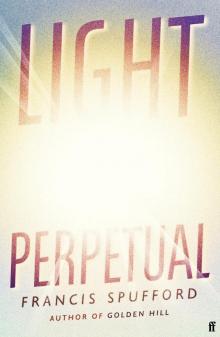 Light Perpetual
Light Perpetual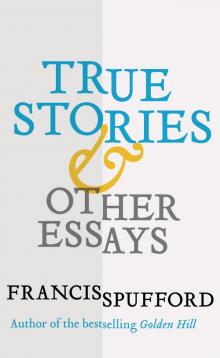 True Stories
True Stories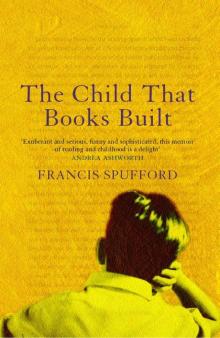 The Child that Books Built
The Child that Books Built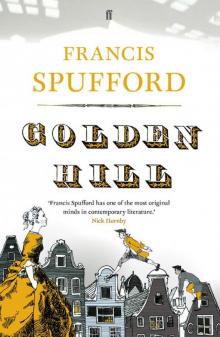 Golden Hill
Golden Hill Unapologetic
Unapologetic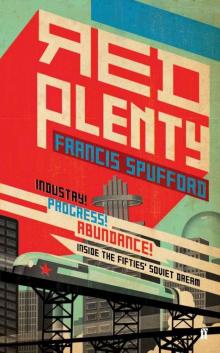 Red Plenty
Red Plenty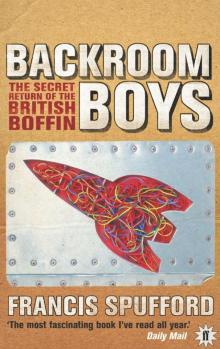 Backroom Boys
Backroom Boys